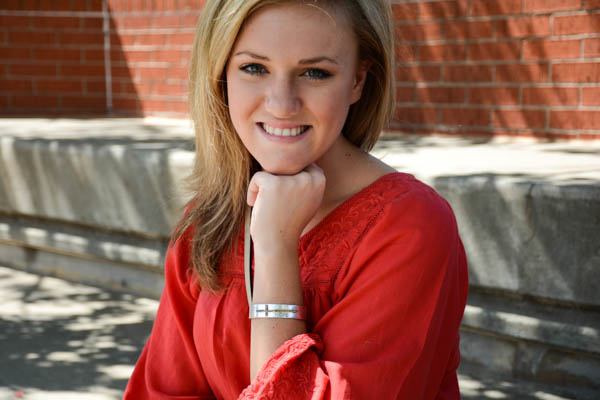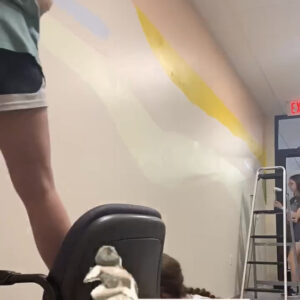Photo by: Abby Bellow
After losing her pinky toe to a rare form of skin cancer, Cathleen Sizemore, an Oklahoma Christian University sophomore, returned to school with a positive outlook.
“It’s like another way for me to connect with people and share my story and what God has done for me,” sophomore Cathleen said. “It allows me to sympathize with people who have been through something like this.”
According to Cathleen, the growth on her left pinky toe had been there for years, but the doctors she had seen in the past were unsure of the cause of it. She decided to get it looked at by a dermatologist after returning from Zambia, Africa last summer.
“They just thought it was a callus and told me to put salicylic acid on it and rub it off with a pumice stone, and that didn’t work,” Cathleen said. “So, we went and the dermatologist had no idea what it was either. She thought it looked like scar tissue and she never even mentioned the word cancer. She decided to take a biopsy just in case, and good thing she did because I probably still wouldn’t know.”
On July 1, Cathleen was shopping with her sister, Channing Sizemore, and their mom when she got the results of the biopsy.
“When we first found out, we were in the dressing rooms at J.Crew and she came out crying on the phone with her dermatologist,” senior Channing said. “And she was just mouthing to us that she had skin cancer. We just didn’t really believe it and it was weird around the house for the next few days. But, it wasn’t something that sank in for a while. It really didn’t feel like a big deal at first because we couldn’t understand it, I guess.”
According to the sisters, the next few days between consultations and appointments were different around the house as the family tried to make sense of the situation.
“[The hardest part was] just knowing that my future could be completely postponed or it could be completely fine,” Cathleen said. “It was kind of like nothing else was important anymore. Coming back to school and stuff like that, in my mind, almost became an impossibility sort of. It was a lot of shock and a lot of uncertainty.”
Plans to return back to school and participate in freshman orientation, Earn Your Wings, were temporarily postponed for Cathleen. There was an out pour of response from her friends at Oklahoma Christian.
“During my life, I’ve had a lot of people – family and friends – affected by cancer and so it brought back a flood of memories, some good and some bad,” Brooks Stephenson, Cathleen’s boyfriend, said. “I think my first thoughts were about how I could help and what [her having cancer] meant. I asked myself what I was doing four hours away from her.”
Stephenson worked as an intern at a church in McKinney, Texas this summer, a few hours from Cathleen’s home near Houston, Texas. Stephenson said the distance was especially hard with Cathleen’s diagnosis.
“I felt like I was there for her, to an extent, but it was almost like she was there for me a lot of times,” Stephenson said. “That’s just another testament to how great she is. But, it was weird that [she] actually had the cancer was actually there for me in that moment.”
According to Cathleen, doctors initially thought the tumor would be 4.1-millimeters deep. Upon removing the toe, however, they discovered a 6.9-millimeter deep tumor, classifying a stage-three melanoma diagnosis.
“The day that I found out that I had to have my toe cut off, I was freaking out and was so upset about it and having a total meltdown all over the hospital,” Cathleen said. “Then I got home and told my sisters and … we laughed about having a toe going-away party and all this stuff.”
After the first surgery on July 31 where doctors removed her affected toe, the doctors also performed a sentinel lymph node biopsy to help determine the extent of cancer in her body.
“Any cancer that becomes metastatic will start at one location and then migrate to a new location,” Associate Professor of Biology Eric Phelps said. “When cancer cells move into the bloodstream, they can end up anywhere in the body and are therefore the most deadly. About fifty-percent of those that have metastatic melanoma also end up having these tumors in the brain.”
According to Cathleen, seventeen of the eighteen lymph nodes removed were clear and the one affected showed only a 13th of a 100th amount of cancerous tissue. Preventative treatments are being evaluated in Cathleen’s case, but she has been declared cancer-free as of her last surgery on August 20.
“The FDA just approved a potentially very important drug to treat specific types of late-stage melanomas [on September 4],” Phelps said. “The new drug blocks the ability of the melanoma to use its cell surface protein to shut off the T-cells that would normally kill it. This allows T-cells to do their job normally and clear the body of these potentially deadly cells.”
The new developments in the medical field around melanoma cancer are still being tested and evaluated, but provide some hope to future patients.
“As scientific researchers learn more and more about the genetic mutations that cause melanoma, they will identify even more potential targets for therapy,” Phelps said.
Between surgeries for Cathleen, she was on her way to a consolation and a stranger stopped her and her family to share a token of hope, according to Cathleen. The woman shared the story of her husband being declared cancer-free, passing his bracelet on to Cathleen as an encouragement in her own cancer story.
“For me, it was kind of like a God is definitely in this hospital moment,” Cathleen said. “So, now I have this bracelet and since I found out that I’m now cancer-free, I’m going to take it back to the hospital and give it to somebody else.”















Be First to Comment